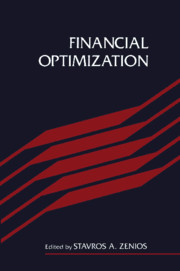Preface
Published online by Cambridge University Press: 09 February 2010
Summary
In November 1989 a Conference took place at The Wharton School, University of Pennsylvania on the topic of financial optimization. Several distinguished speakers from academia and industry presented that state-of-the-art in modeling and solving a variety of problems that are central to the financial services industry.
The objectives of the conference are best described by introducing the two keynote speakers: Professor George B. Dantzig from Stanford University and Professor Harry M. Markowitz from Baruch College of the City University of New York. These are the founding fathers of two diverse disciplines. Dantzig is credited with the origins of management science through his pioneering work with linear programming in the 1940s. This is a discipline that has touched many endeavors of our society: transportation, manufacturing, the military, economics, and financial services. Markowitz is credited with the foundations of modern portfolio theory for his seminal contribution in risk management through mean-variance models in 1952. His contribution has touched — over the years — most practitioner and academic studies for portfolio management and provided the basis for the derivation of equilibrium models for the financial markets. It was recognized by a Nobel prize in economics in 1990.
The aim of the conference was to bring together these two disciplines, and survey the current state of interaction between them.
Information
- Type
- Chapter
- Information
- Financial Optimization , pp. xiii - xviPublisher: Cambridge University PressPrint publication year: 1993
